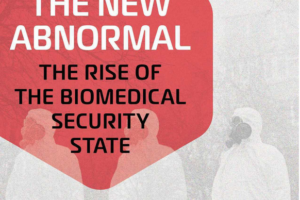During the COVID-19 pandemic, public health authorities—once relatively obscure government agencies—were given unprecedented power to manage citizens’ lives in the name of public safety.
Some critics have argued that this situation brought into focus a number of long-standing trends of modernity: trends toward medicalization, scientific rationalism, and state surveillance in liberal societies. Any plausible analysis of pandemic public policy needs to consider whether or to what extent these deeper sociological and philosophical trends were manifest during the pandemic.
Aaron Kheriaty’s The New Abnormal: The Rise of the Biomedical Security State is one of the most philosophically literate (and controversial) COVID-19 post-mortems to date.
Kheriaty, a psychiatrist who for many years worked in the University of California medical system, holds a degree in philosophy from the University of Notre Dame and has written extensively on the intersection between medicine and theology.
An unholy alliance
His new book offers an in-depth critique of what he labels the “biomedical security state”: an “unholy alliance of (1) public health, (2) digital technologies of surveillance and control, and (3) the police powers of the state.”
Kheriaty appears to have in mind a state apparatus akin to what President Eisenhower called the  “military-industrial complex,” or the problematic close relationship between a country’s military, defense industry and governing class. In the case of Kheriaty’s biomedical security state, however, it is medicine, public health, and the pharmaceutical industry who have teamed up with big government.
“military-industrial complex,” or the problematic close relationship between a country’s military, defense industry and governing class. In the case of Kheriaty’s biomedical security state, however, it is medicine, public health, and the pharmaceutical industry who have teamed up with big government.
The ostensible justification for this “unholy alliance” is public health and biosecurity as opposed to the geopolitical security interests that drive the military-industrial complex.
First-hand experience
Kheriaty’s book is motivated in part by his (very public) personal experience with institutional COVID-19 vaccine mandates. In 2021, Kheriaty was suspended and then sacked from his faculty position at UC Irvine’s School of Medicine for refusing to receive a COVID-19 vaccine.
Kheriaty’s logic was that he had already had COVID-19; he claimed scientific studies showed natural immunity following infection was superior to vaccine-mediated immunity. He launched a legal challenge against the university’s vaccine mandate and took to the media to prosecute his case.
But Kheriaty’s book is not an attempt to persuade readers that the global COVID-19 pandemic response was disproportionate. What Kheriaty’s study attempts instead is a genealogy of the emergence of the modern biomedical security state.
Are certain questions forbidden?
Throughout his analysis, Kheriaty draws upon post-WWII anti-totalitarian literature. He engages in particular with the work of philosophers Augusto Del Noce, Eric Voegelin, and Giorgio Agamben to articulate how a power can be rapidly centralized by state actors and used for coercive purposes against a population.
Kheriaty takes, for example, Voegelin’s observation that the essence of totalitarianism is that “certain questions are forbidden,” and compares this to the prohibition on dissent in the pandemic:
If one asks certain questions—do we really need to continue locking down? Or, are we sure these vaccines are safe and effective? Or, why has the promised utopia not yet arrived?—one will be accused of being a pandemic denier, wanting to kill grandma, being anti-science, or of placing oneself on the “wrong side of history.”
What is scientism?
Kheriaty’s principal philosophical concern is “scientism,” the modern view that “science is the only valid  form of knowledge.”
form of knowledge.”
Scientism should not be confused with the scientific method, which, when practiced rigorously, delivers genuine discoveries and important advances. Scientism, in contrast, is understood as “a religion—a closed and exclusionary belief system.”
Kheriaty invokes Del Noce who wrote 50 years ago that “many people do not realize that scientism and the technological society are totalitarian in nature.”
A society in which scientism is the only accepted epistemology is a world in which moral, metaphysical or religious perspectives are excluded. A scientistic society, according to Kheriaty, is one which is “suited neither to a meaningful human life nor to social harmony.”
The biomedical security state
In the extreme version of Kheriaty’s biomedical security state, the human person risks being “reduced to bare biological life—a mere collection of muscles, tendons, ligaments, and bones—with regrettable energy and excretion requirements.”
This state “takes the religious form of revolutionary neo-Gnosticism” where “an elite class of unelected but credentialed bureaucratic managers administer the system.” It “pushes depersonalization and alienation to the extreme, constituting a dehumanizing regime that inevitably moves toward totalitarianism.”
Contemporary public health policy
It is hard to imagine a stronger critique of contemporary public health policy than that which Kheriaty presents. The historical comparison of the pandemic era to the totalitarian regimes of the 20th century is dramatic. Many practitioners of public health will no doubt take issue with his argument.
But Kheriaty is not focused on any particular social actors as the culprits of what he sees as an uptick in state-sanctioned coercion. His deeper argument—one that may be of value regardless of one’s assessment of the global pandemic response—is that we are witnessing a dehumanization of society driven by a covert, reductionist ideology.
Kheriaty believes that it is only through a return to a non-reductionist anthropology—one rooted in classical conceptions of the human good—that we will return to some degree of political and social normality when thinking about public health.
There is much that could be made of Kheriaty’s broad-ranging sociological critique of the so-called  biomedical-industrial complex, even if one does not see the situation being as dire as the author suggests.
biomedical-industrial complex, even if one does not see the situation being as dire as the author suggests.
One is left wondering, however, if Kheriaty believes that public health can play any constructive role in bringing about a more humane world. Kheriaty is clearly suspicious of the involvement of medicine and public health in providing solutions to societal problems.
Disenfranchisement of ordinary citizens?
According to Kheriaty, the medicalization of human life leads to a disenfranchisement of ordinary citizens, ultimately impeding our ability to tackle social ills like racism:
With public health takeovers like this, we paradoxically hamstring ordinary people’s ability to address a problem like racism: the issue now requires the technocratic ministrations of so-called experts, and health experts no less. Authority to address the problem is taken from ordinary citizens and civic institutions and transferred to scientific ones.
This is plausible—even for readers who object to Kheriaty’s assessment of the pandemic.
It is hard to imagine a dimension of social life that hasn’t in some ways been “enframed” by a pseudo-medical conceptual framework. Corporate “wellness culture,” the medicalization of recreational drug use, and the use of euphemisms such as “medical aid in dying” or “assisted dying” (for euthanasia and assisted suicide) are characteristic of our hyper-medicalized culture.
A solution?
But might there be a way of broadening the remit of public health that doesn’t run afoul of the basic medical ethical principles and civil liberties that Kheriaty is concerned about?
It is not inconceivable that public health could take account of human capacities for transcendence and, in fact, that public health can help us to more effectively identify how we can facilitate human flourishing at a population level.
This is a question that institutes such as my own—the Harvard Human Flourishing Program—are seriously grappling with. The program seeks to utilize the resources of public health and social scientific research to study a range of questions related to individual and communal wellbeing.
Some of these questions include: What is the role of health in human flourishing? What is the role of religious community in a flourishing society? Does suffering have a role to play in the good life? Could public health initiatives focused on fostering interpersonal love and forgiveness potentially improve collective wellbeing?
Societal and community wellbeing
Medicine and public health are not the only source of insight on questions of societal and community wellbeing. But they need not be excluded from making considered interventions.
On the contrary, there is a meaningful sense in which the disciplines of medicine and public health can be concerned with much more than biological realities. Rather than adopting an epistemology that precludes philosophical and theological questions—the “totalitarian scientistic epistemology” that  Kheriaty warns of—we should seek to foster spaces in which different epistemologies can interact in a mutually enriching way.
Kheriaty warns of—we should seek to foster spaces in which different epistemologies can interact in a mutually enriching way.
One of the key moral lessons from the pandemic was the idea that our pursuit of health ought not be to the total exclusion of other human goods. Disciplines like public health must acknowledge the importance of other human and spiritual goods: what Kheriaty calls “family, friendship, community, knowledge, beauty, worship, devotion, virtue, God, and so on.” But by the same token, we ought to recognize the capacity of public health to usefully contribute to reflection on how societies can better realize these goods.
RELATED RESOURCES:
- The New Abnormal: The Rise of the Biomedical Security State – by Aaron Kheriaty, MD
- Human Flourishing — Aaron Kheriaty, MD, substack column
- Xavier Symons, author of this article and his work at Harvard
————–
Xavier Symons is a Postdoctoral Research Fellow at the Human Flourishing Program in the Institute for Quantitative Social Science, Harvard University. He previously worked as a bioethicist at the Australian Catholic University and The University of Notre Dame Australia. Xavier’s research interests include ethical issues at the beginning and end of life, conscientious objection, the ethics of healthcare resource allocation, and pandemic ethics. His first book, Why Conscience Matters: A Defence of Conscientious Objection in Healthcare, was published in July 2022 by Routledge. Dr Symons is the recipient of a 2020 Fulbright Future Postdoctoral Scholarship and was a scholar in residence at Georgetown University’s Kennedy Institute for Ethics from September 2021 to March 2022. He holds degrees from the University of Sydney, the University of Oxford, and the Australian Catholic University.
Subheads in the article added by Catholic Business Journal editor for improved readability online.



You must be logged in to post a comment.